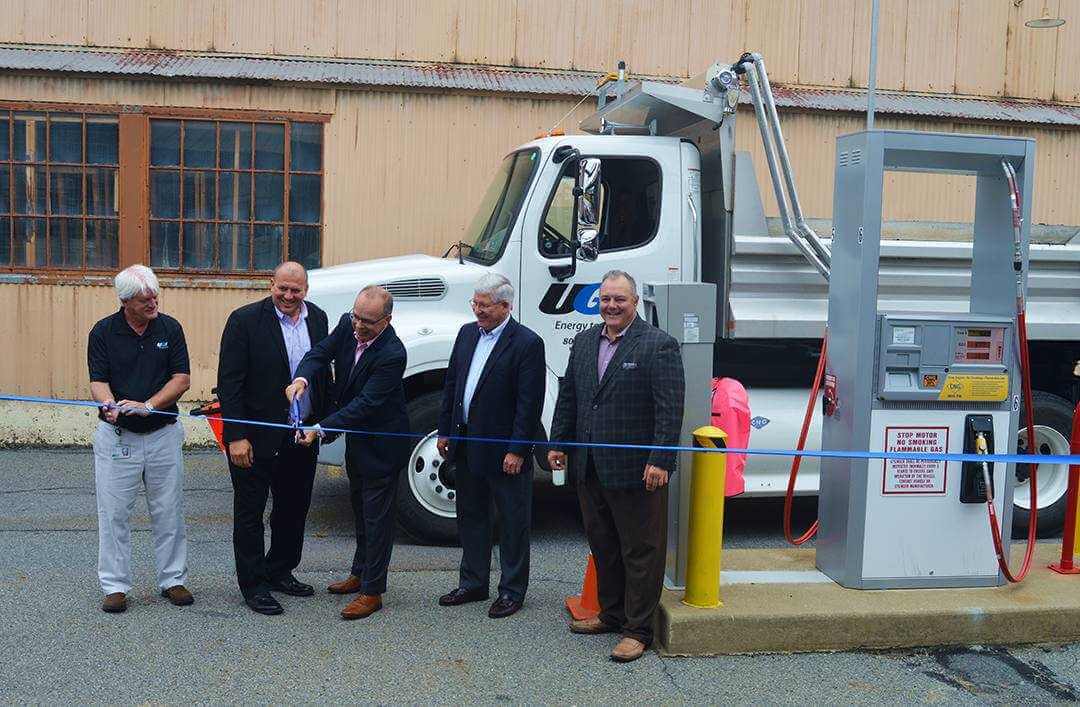
Wilkes-Barre, Luzerne County, PA -
UGI officials cut a ribbon Tuesday to celebrate the opening of a new compressed natural gas fueling station at the company's Wilkes-Barre office on East Northampton Street.
The utility invested $700,000 in the station that will help serve its growing fleet of Wilkes-Barre-based natural gas-powered vehicles, said UGI relationship manager Joe Bauman.
The new station joins another UGI compressed natural gas fueling facility in Bethlehem to serve the company's growing fleet of 85 vehicles fueled by compressed natural gas. An additional 19 are expected to be delivered in the near future, bringing the utility's total compressed natural gas-fueled fleet to 104.
UGI mechanic Rich Munley demonstrated filling a truck with compressed natural gas and it took about the same amount of time as filling a gasoline vehicle.
Bob Stoyko, UGI vice president of marketing and customer relations, said by using compressed natural gas, the utility is seeing a 50% savings from the cost of diesel and a 35% percent savings from the cost of gasoline.
“We're running multiple vehicles day in and day out. For us, it generates a significant value,” Stoyko said. “With this investment, UGI transitioned approximately 12% of its entire fleet to clean-burning compressed natural gas. Also by this investment, we are reducing individual vehicle emissions by up to 90%.”
The closest compressed natural gas station open to the public is the U.S. Gain station in Pittston Twp. While the average retail price of natural gas is $2.22 for the equivalent of a gallon of gasoline, Stoyko said UGI is paying a rate of less than $1.50 for the equivalent of a gallon.
Officials from some Northeast Pennsylvania firms who already converted their fleets to compressed natural gas attended the ceremony Tuesday including Waste Management in Dunmore, LT Verrastro in Old Forge and Core-Mark in Hanover Twp.
Bauman highlighted many economic and environmental advantages that compressed natural gas vehicles have over traditional gasoline cars, trucks and vans.
“It's cleaner. It's cheaper, your engine lasts twice as long.”
Since natural gas burns cleaner, Bauman said it results in less oil changes and maintenance costs. Since it is a domestic fuel, it does not need to be imported from another country, he said.
According to a presentation he delivered, about 250,000 natural gas-powered vehicles are on the road in the U.S. and about 12 million around the world. There are about 1,500 public compressed natural gas stations in the U.S. and more than 13,000 across the globe.
More than 17,000 refuse trucks and one of every five new transit buses in America run on natural gas. The percentage of buses powered by natural gas has increased from 18.5% in 2008 to 29.9% in 2017.
Bauman said he is seeing momentum in Northeast Pennsylvania because the cost of natural gas is attractive to large fleet users.
“They're actually seeing the savings that we've been pitching to them,” he said. “They're living the success of not only cleaning up the environment but saving money and their vehicles lasting longer. Their investments are paying off.”